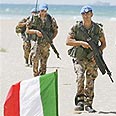
Italian troops in Lebanon
צילום: איי פי
Italy: Troops will respond if attacked
Italian ambassador to Israel tells Ynetnews that if Hizbullah attacks Italian troops serving in peacekeeping force they will respond in self-defense
Italian forces taking part in the United Nations peacekeeping force in Lebanon will retaliate if they are attacked by Hizbullah or any other armed group in the tiny Mediterranean country, Italy’s Ambassador to Israel Sandro De Bernardin told Ynetnews on Wednesday.
“Of course they will respond. They have the right of self-defense,” he said.
De Bernardin added that the Italian government opted for a generous contribution to the UN peacekeeping force in Lebanon based on the conviction that stability in the Middle East served Europe’s security interests.
Italy agreed to send 2,500 troops to a UN peacekeeping force tasked with implementing a truce between Israel and Hizbullah under Security Council Resolution 1701, which ended 34 days of fighting. The Resolution mandates the force with helping the Lebanese Army send troops to the south of the country for the first time in decades and halt weapons supplies to Hizbullah.
“I would say that our commitment depends mainly on two reasons. The first is the conviction that the stability and the security of this region are of paramount importance also to the security and stability of Europe. It is in our own interest to contribute to a solution for the problem of this region,” Mr. De Bernardin said.
Bernardin added that Rome is “aware that peace has its price” but believes that the burden of securing stability in the Middle East is a responsibility that should be shared by the international community.
Asked whether Italy feared that its military involvement in Lebanon could touch off terror attacks by Islamic fundamentalists against civilians back home, De Bernardin said the Italian government was aware of the threat of terrorism but there was “no specific reason” for alarm.
About UN Secretary-General Kofi Annan’s visits to Damascus and Tehran, and the credibility of reaffirmations from both capitals to cooperate on the implementation of Resolution 1701, Bernardin said Italy believes that western countries should isolate neither Iran nor Syria, a position shared by most European capitals but opposed by Washington.
With regards to Iran’s controversial nuclear program, Bernardin said that should the Security Council approve tough sanctions on Tehran or even the use of force as a last resort to halt the Islamic Republic’s nuclear activities, Italy would back such moves.
“We are very supportive of this orderly and legal approach on the use of force. If the Security Council will decide one day that any course of action should be taken then of course Italy will play a role,” he said.
Taking issue with the possibility of Israel launching preemptive strikes against Iran, he said: “I hope this is not on the agenda.”
Asked why, unlike Hamas, Hizbullah were not on the EU’s list of terror organizations, Bernardin said that Hizbullah’s solid integration in the Lebanese political and social system made it difficult for the EU to classify the Shiite guerillas as a terror group.
“With Hizbullah the discussions within the European Union have been more difficult so far because Hizbullah has developed more the political side of the organization,” he said.
He boasted that it was in 2003, when Italy held the rotating EU presidency, that Hamas was listed as a terror organization by the block. “As you know when it comes to Hamas, Italy and the European countries are very firm in maintaining that Hamas needs to accept Israel before accepting them as a political interlocutor,” he said.










